Thousands of raucous Chinese basketball fans pack tightly into a floodlit stadium filled with swirling fog, eager to spur on the teams battling in the tournament final.
It is almost midnight in Taipan — a remote village in southwest Guizhou Province — but the championship game is only just getting under way after a weekend of action.
Clanging pots and pans punctuate the hum of the crowd in the steep main stands, while millions of online viewers and social media users hold their breath as the jump ball is tossed.
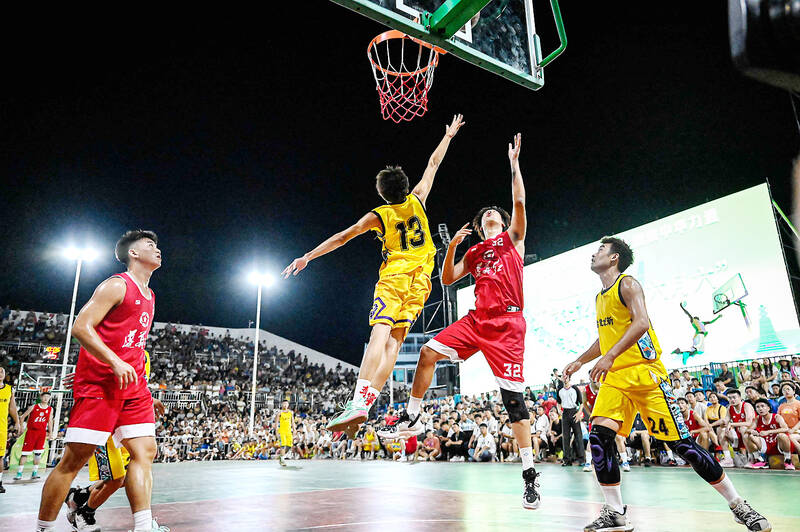
Photo: AFP
This is China’s village basketball, a grassroots phenomenon that has spiraled in the past few years from a humble local tradition into a viral hit and staple of Beijing’s propaganda machine.
Basketball is hugely popular in the country, but widespread corruption and recent investigations into match-fixing within the CBA, China’s top domestic league, have discouraged many fans and diverted their attention elsewhere.
Athletes in “CunBA” — with “cun” meaning village in Chinese — are all amateurs, and the prizes are simple platters of roast meat but it is the pure electricity of the games that keeps fans and players hooked.
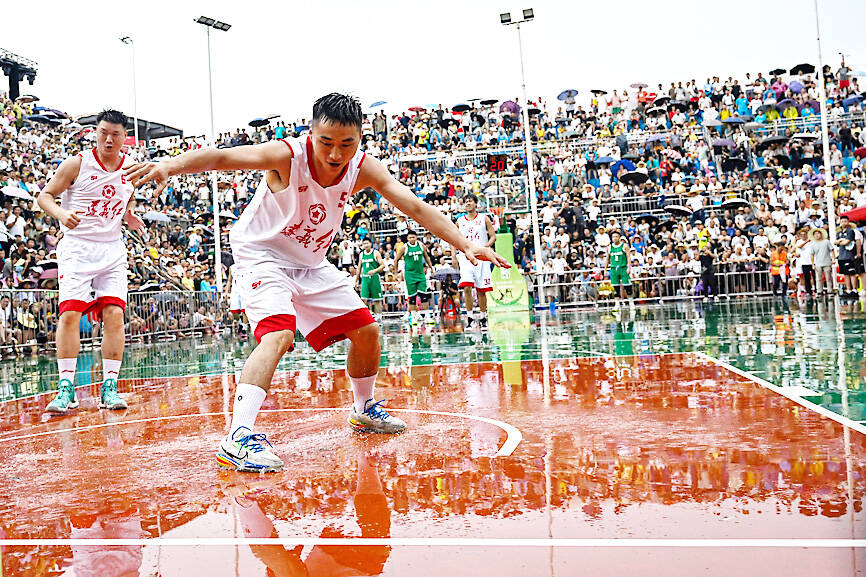
Photo: AFP
“As soon as I arrived in Taipan village, the first thing I sensed was a feeling of enthusiasm and excitement,” Xia Wenxian said.
Xia, 30, has come as part of a team proudly representing his home village of Gaoding, tucked away in the rugged hills of Guizhou more than 100km away.
“Our CunBA has the same competitive sporting spirit as the CBA and NBA,” Xia said, as he prepared for his team’s crucial semi-final later that evening.
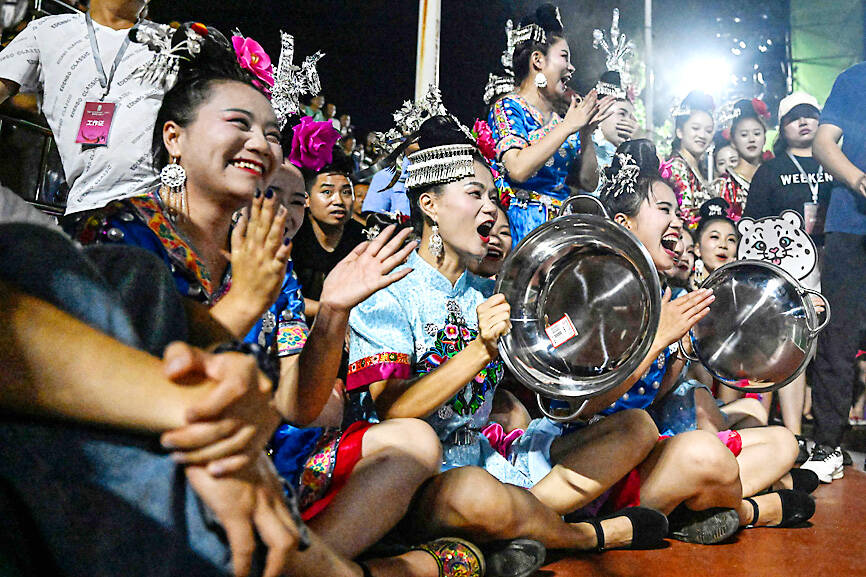
Photo: AFP
The tradition of holding annual basketball competitions goes back decades in Taipan, a village in minority-dominated Qiandongnan Miao and Dong Autonomous Prefecture, but only in the past few years has the concept caught on beyond the local area.
It is an unlikely site for a national tourist attraction, but the roaring success of the CunBA on Chinese social media and glowing praise by official media have brought throngs of visitors this summer.
In Taipan’s main thoroughfare on the afternoon before the final, locals in traditional Miao clothing lay out fruit and other items for sale as a police helicopter makes noisy circles above and eager spectators arrive from far and wide.
Organizers say the densely packed village stadium holds more than 20,000 fans — more than 16 times Taipan’s population of 1,200.
Xinhua news agency said that collective online viewership of CunBA competitions has topped 100 million.
The rise of village basketball has provided a golden opportunity for businesses and politicians to capitalize on the public ardor.
A brochure handed out in Taipan by the local county’s culture and tourism bureau expounds upon CunBA’s recent success, calling it “a window to observe Chinese-style modernization,” a slogan often employed by the Chinese Communist Party.
In between the sometimes rain-soaked contests, there are impassioned musical performances featuring dancers from minority groups wearing brightly colored clothing, projecting a rosy image of ethnic harmony and respect for local customs.
Chinese state-backed media has also jumped in, with the Global Times saying that CunBA is “aimed not only at enriching the leisure activities of rural residents but also at promoting rural revitalization and the construction of a strong agricultural nation.”
During halftime at one game, fans waved dozens of huge Chinese national flags while performers in costumes resembling the military uniforms worn by the People’s Liberation Army in the 1940s marched across the court.
Crimson banners adorn the village’s buildings, with one reading “rural sports, letting the light of the countryside illuminate the future.”
“CunBA, unite and work hard, advance forward bravely,” another reads.
Above the court, a sign reads: “All ethnic groups enjoy sporting events together, carrying forward Chinese spirit, gathering Chinese power.”
As CunBA grows in popularity, so too does its profitability.
Late last month, NBA star Jimmy Butler visited Taipan village, where he was greeted by thousands of adoring fans and players with whom he dribbled and made practice shots on the court.
Butler, who earlier this year led his Miami Heat to an appearance at the NBA Finals, is an official marketing partner of leading Chinese sportswear brand Li-Ning.
One week after the NBA star left, Taipan village was still buzzing with excitement.
Li Wending, 44, brought his two sons — both huge fans of US star Stephen Curry — from neighboring Hunan to watch the final day’s play.
“The atmosphere at these village games is always amazing,” Li said. “For CBA games, we can just watch them online, but for CunBA, it’s so much better to come to the actual site and experience the excitement of the fans.”
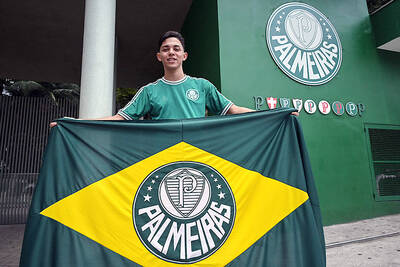
Brazil has four teams, more than any other country, in the expanded Club World Cup that kicked off yesterday in the US, but for SE Palmeiras, the competition holds a special meaning: winning it would provide some redemption. Under coach Abel Ferreira since 2020, Palmeiras lifted two Copa Libertadores titles, plus Brazilian league, cup and state championships. Even before Ferreira, it boasted another South American crown and 11 league titles. The only major trophy missing is a world champions’ title. Other Brazilian clubs like Fluminense FC and Botafogo FR, also in the tournament, have never won it either, but the problem for Palmeiras
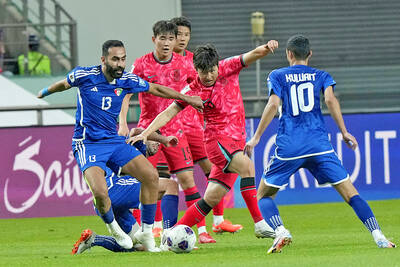
Paris Saint-Germain’s Lee Kang-in has pleaded with South Korea fans to get behind the team at the 2026 FIFA World Cup after more boos were aimed at coach Hong Myung-bo despite leading them to qualification. South Korea reached next year’s finals in North America without losing a game, but that does not tell the whole story. The country’s soccer association has been in the firing line, having scrambled about to find a successor after sacking the unpopular Jurgen Klinsmann in February last year. They eventually settled on Hong, the decorated former skipper who had an unsuccessful stint as coach in 2013-2014, during which

Lionel Messi drew vast crowds and showed flashes of his brilliance when his Inter Miami side were held to a goalless draw by African giants Al-Ahly as the revamped FIFA Club World Cup got off to a festive start on Saturday. Fans showed up en masse for the Group A clash at the Hard Rock Stadium, home to the NFL’s Miami Dolphins, but Messi could not fully deliver, his best chance coming through a last-second attempt that was deflected onto the crossbar. Inter Miami next face FC Porto on Thursday in Atlanta, while Al-Ahly, who benefited from raucous, massive support, are to
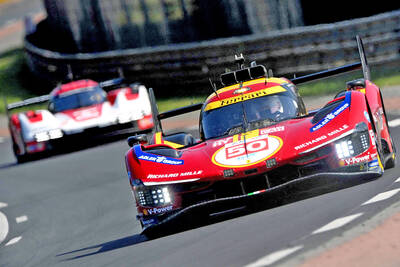
Ferrari’s F1 fortunes might be flagging, but the Italian team start this weekend’s 24 Hours of Le Mans as favorites, targeting a third consecutive triumph in motorsport’s fabled endurance classic. Roger Federer is acting as celebrity starter with the tennis icon getting the 93rd edition of the jewel in four-wheeled endurance racing’s crown under way tomorrow. Twenty-four hours later, through daylight, darkness and dawn, the 21 elite hypercars are to battle it out over 300 laps (more than 4,000km) in front of a sold-out 320,000 crowd burning the midnight oil with copious quantities of coffee and beer. Ferrari made a triumphant return after